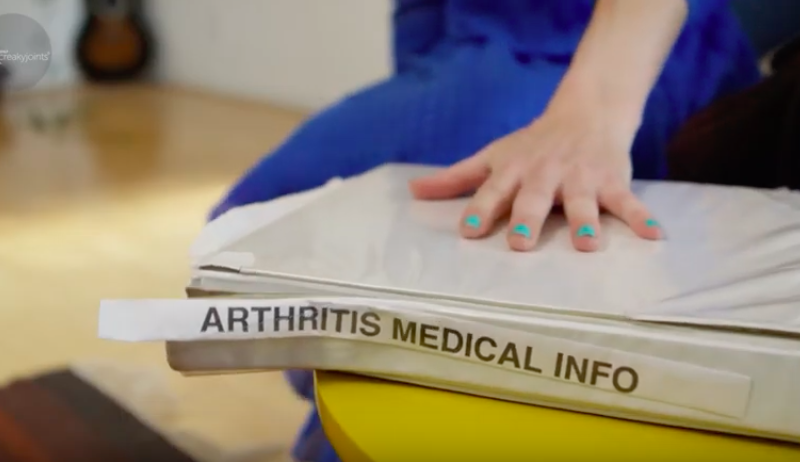When you have a chronic illness like arthritis, you’re seeing the doctor pretty often. Those visits can be productive, enlightening, and supportive — or they can be confusing, frustrating, and upsetting. Chances are, you’ve experienced both kinds if you’ve been dealing with chronic condition long enough.
While a huge part of a successful doctor visit is having a good doctor-patient relationship in the first place, what you do before, during, and after appointments plays a big role in helping you get the care and treatment you need.
“It’s your time and you want to make the most of it,” says Nicole Dalton, a CreakyJoints member who has been living with systemic-onset juvenile idiopathic arthritis for nearly 30 years. “Remember, your doctors are working for you, but it doesn’t always feel that way. As invisible illness patients, we have to prepare ahead of time to maximize our doctor visits and get what we need to live our fullest, healthiest lives.”
A Better Way to Prepare for a Doctor Visit
This issue is what inspired Nicole, an actor and comedian who lives in Los Angeles, to create a digital campaign called Dress to Depress: An Invisible Illness Guide to Getting Ready for a Doctor’s Appointment. Working with CreakyJoints and a team of writers, producers, and actors who each lives with or advocates for invisible chronic illnesses, such as systemic-onset juvenile idiopathic arthritis, Crohn’s disease, multiple sclerosis, and gastroparesis, Nicole and her cast and crew wanted to creatively demonstrate the challenges around preparing for doctor visits when you have a chronic illness.
Watch the video here:
To better understand how CreakyJoints members get ready for doctor visits, we surveyed more than 2,300 people about this topic. We learned that 47 percent see a rheumatologist for the treatment of their primary condition. Roughly 36 percent see their provider every two to three months; 35 percent see their provider every four to six months; and 11 percent see their provider once a month.
Somewhat surprisingly, 18 percent said they do not prepare for a visit, but many patients do:
- 61 percent of respondents make a list of questions
- 48 percent of respondents keep notes about their symptoms
- 33 percent of respondents make a list of prescribed and over-the-counter medications
- 20 percent of respondents track their symptoms with a pen and paper
- 7 percent of respondents track their symptoms with an app, such as PatientSpot
We then asked CreakyJoints members — who’ve experienced years and years of positive and negative interactions at doctor visits — for their best tips to ensure more productive and helpful appointment. Here’s what they shared.

Before the Doctor Appointment
In our CreakyJoints survey, 13 percent of patients said they often forget to bring up details about their symptoms or other issues. (Thanks, brain fog.) Making questions and tracking symptoms in advance can help you stay focused and prevent memory lapses. Consider these tips for more help:
Track symptoms
“Make a fatigue and pain tracker with notes below.” — Karin M.
“I use a website symptom tracker — all the time — to review beforehand and address issues, both positive and negative.” — Cindi S.
“Have a symptom chart for review, but have the new or more severe ones highlighted. Many doctors don’t want to take the time to review a month’s worth of data.” — Nana C.
Take photos of symptoms between visits
“I take photos of swollen joints and even my face when I’m in a bad flare.” — Lori E.
“It seemed weird to show photos on my cell phone, but the doctor found it very useful.” — Andi R.
Make a list of questions
“I keep a running list of questions in my phone so I don’t forget things that have come up. I also make notes about the visit and make sure to get my summary at the end so that I can review it after my appointment. There is an app I can use to send messages to my doctor and if something comes up that I forgot or had questions about, I’m always welcome to contact her.” — Rene M.
“I write any questions on a 3×5 card with room for answers, keeping in mind they don’t have much time.” — Lori E.
“I always have a list prepared — and it includes questions from my husband. My doctor expects and even asks if I have it ready for him. During the visit, he is always willing to expand on a topic if I have questions. Afterward, I review the appointment with my husband.” — Judy F.
“Plan. This might be your only chance for change for several months until your next appointment. Write down your questions, list what’s changed since your last appointment. Pick your battles, what matters to you most if they had a magic wand that could fix it?” — Joel N.
“I keep a list of concerns and questions since last visit. I review and make the list for my visit. I make sure I hit most important first. I take my med list.” — Linda K.
Take special care when seeing a new doctor for the first time
“If I am meeting a new doctor, I prepare a clinical history sheet highlighting my comorbidities, significant episodes, allergies, contraindicated drugs, vaccination details, etc.” — Kirtida O.
“I have learned that before seeing a new specialist to check — and double check — that they have received my history. Too many times I have had a new consultation with a waiting time of months and the specialist has not even looked at my history beforehand.” — Emma G.
During the Appointment
It can be uncomfortable to be fully candid with the doctor about everything that’s going on. In our CreakyJoints survey, only 60 percent of respondents said they tell their provider everything when discussing their symptoms. A couple of reasons had to do with worrying about how the doctor perceives them — including they didn’t want the doctor to think they are complaining, acting like a “problem patient,” or exaggerating.
But remember that if your doctor doesn’t know the full extent of your symptoms or issues, they can’t fully help you. Consider these tips for more help:
Connect with your doctor
“During the appointment I focus on collaborating with my doctor. I’m a big proponent of making sure you advocate for yourself and, going along with that, I like that my doctor and I work as a team making decisions and not just being directed with no input.” — Rene M.
“I keep my doctor engaged, make eye contact, and take notes if I need. I will bring up new research or such during the visit.” — Linda K.
Be candid
“I try to open up as much as possible and let them know what my function is and how symptoms are affecting me.” — Helena B
Be confident
“I walk in confident that my doctor will hear me out, just as I hear them out. That confidence made all the difference in how I am treated.” — Cheryl W.
“I’ve lived with this diagnosis for eight years now. I know how it affects me and I’m not afraid to say, ‘This is what I want,’ knowing I’ll never be free of rheumatoid arthritis (RA). You have to be your own advocate and be willing to consider new treatments. I won’t ever be pain free, but I want to be able to get out of bed without the stabbing pain in my knees and needing to hobble with a cane until the ibuprofen kicks in.” — Debra M.
“It would be great if [general practitioners] learned to accept that sometimes we know more about our illnesses and recent research as we only need to focus on our own rather than a wide range like they do. I hate being dismissed without discussion.” — Anne B.
“I bring my medical notebook, recent lab work results, a current list of meds, prioritized list of concerns, and questions. If I think my doctor is not listening to me during my appointment I stop talking until I have his attention. When I get home, I review my notes and research new meds before taking them.” — Peg D.
Champion yourself
“Champion yourself, what you’ve done to help [your condition], such as exercise, diet, etc. Show them you help yourself so that you can hold them to their side of the deal. Make sure they leave knowing your daily struggle and what you need to accomplish your ‘normal.’” — Joel N.
Take notes
“During the visit, I subtly remind my doctor some important things about my case. I also keep notes of any important information or advice.” — Elena K.
After the Doctor Appointment
In our CreakyJoints survey, 28 percent of respondents said they’re not able to tell their doctor everything about their symptoms or other issues because there is not enough time. It’s important to let your doctor know at the end of an appointment if you have more questions or issues and how you can go about getting those addressed. Consider these tips for more help:
Have a follow-up game plan
“Always get a printout of your visit for review. Sometimes it’s one visit behind but good to review.” — Cindi S.
Take time to think
“Give yourself time to process what’s been discussed. I’ve had more times than I care to remember where I’ve left an appointment disappointed, upset, or scared. Have a good support network and give yourself a couple of sleeps before deciding next steps.” — Joel N.
Make sure you have a good feeling about your doctor
“I wouldn’t go to a doctor who didn’t listen to me. I have had to replace at least two who I did not communicate well with.” — Kelly C.
Call or email with additional questions
“After, if I have questions, I email her or do some research. If medication changes are made, I update my list, which I carry with me at all times. I debrief with hubby.” — Linda K.
Track Your Symptoms with PatientSpot
Join CreakyJoints’ patient-centered research registry and track symptoms like fatigue and pain. Learn more and sign up here.






